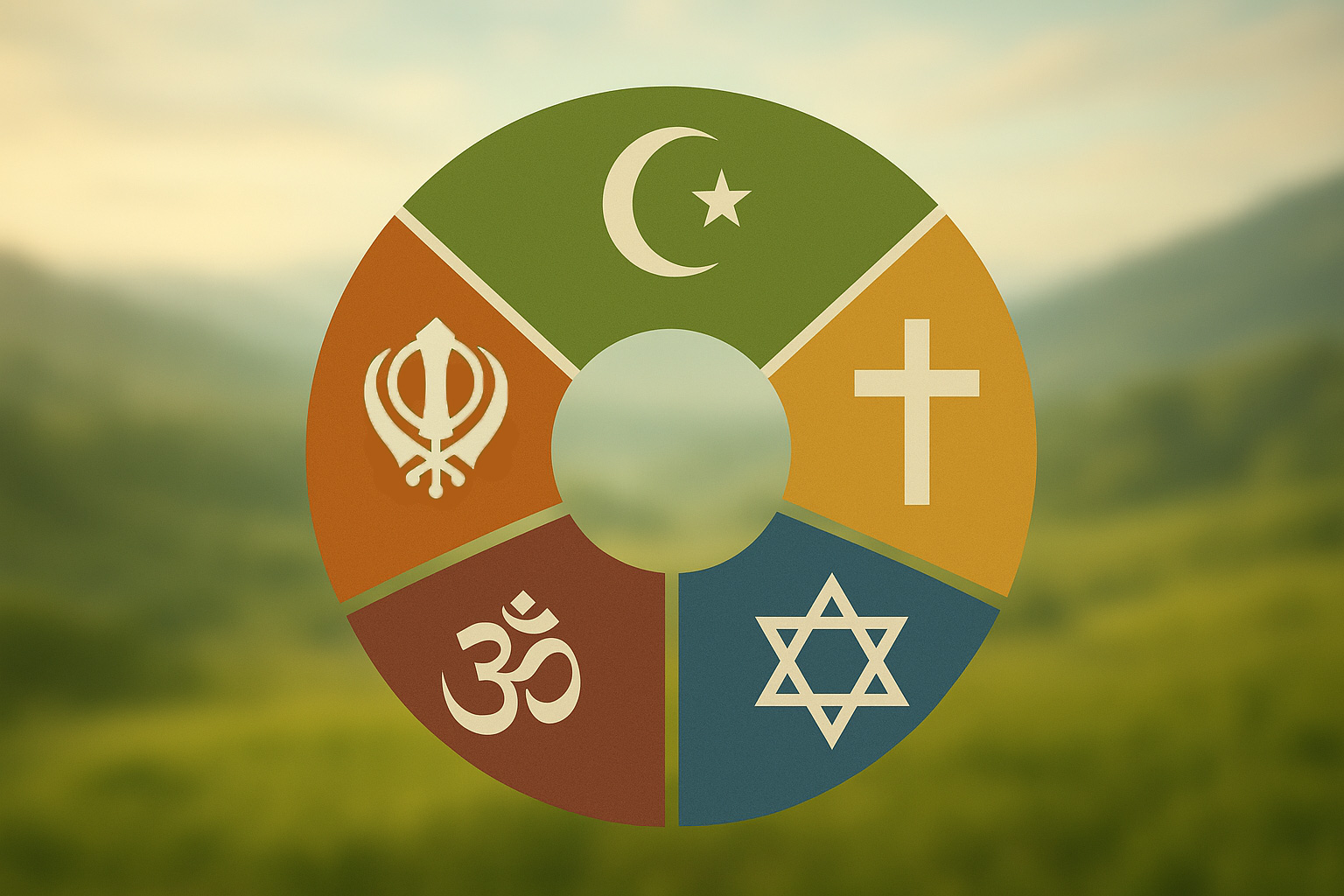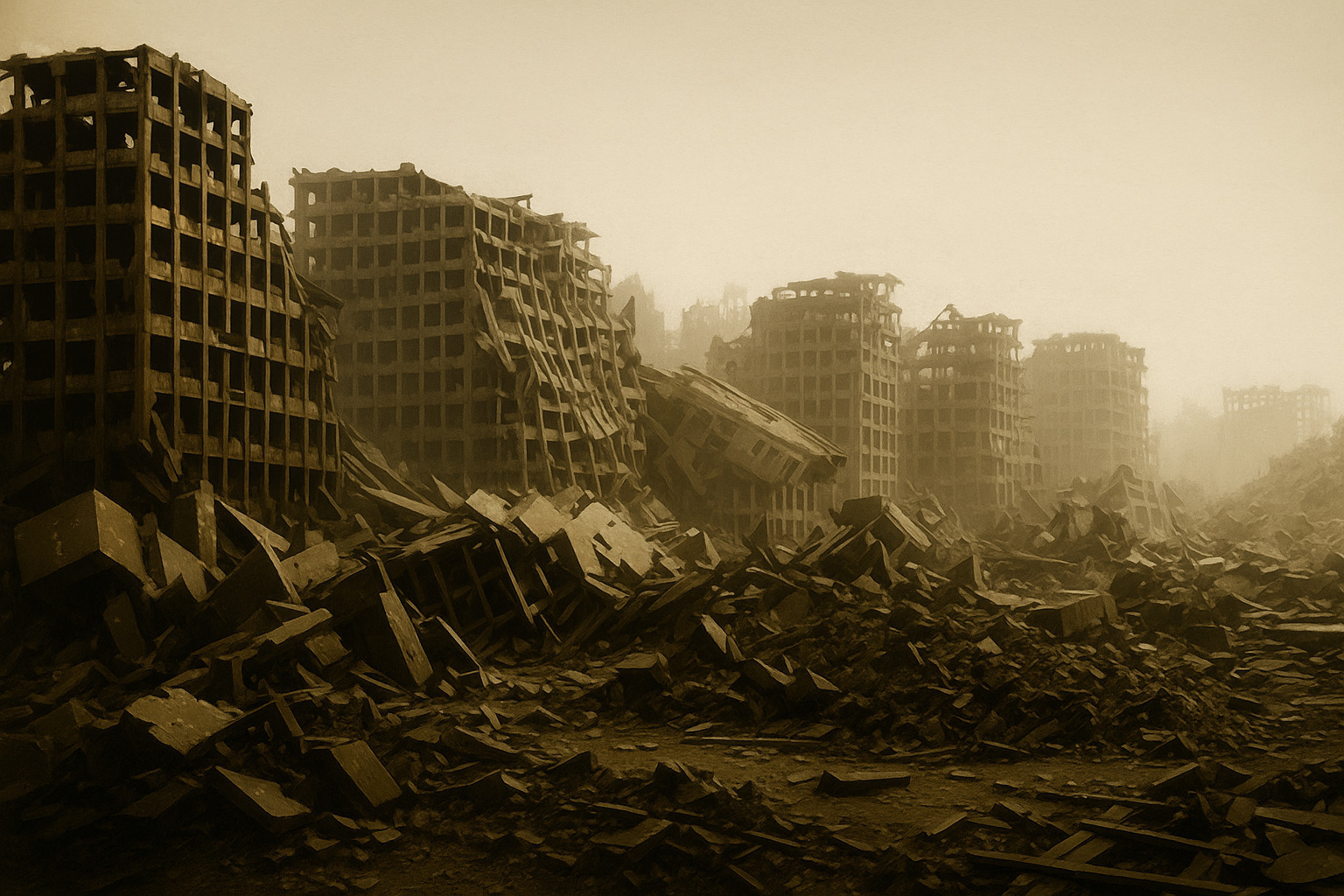Gloom is looming right ahead. Destruction is staring us in the face. Disaster is hanging in the air, growing more real with each passing day. The world is standing on the brink of an unprecedented global catastrophe.
This year, just like the past many years, has only brought more signs of worsening global conditions. The Doomsday Clock has moved to just 89 seconds before midnight—the closest it has ever been to disaster. The world is now caught in 56 active conflicts—the highest number since the end of the Second World War. Even more alarming, 92 countries are involved in wars beyond their own borders.
While these current events clearly show how close we are to a worldwide disaster, they also represent the fulfilment of a long series of warnings given over the past two decades—warnings that were mostly ignored.
For over twenty years, the Worldwide Head and Fifth Caliph of the Ahmadiyya Muslim Community, Hazrat Mirza Masroor Ahmadaba has spoken about the increasing danger of a global nuclear war. Sadly, many dismissed his words as pessimistic. But ever since he started issuing those warnings, the state of the world has only continued to worsen, and every major development has proved his words to be true.
In this article, we discuss the principles for establishing peace as presented by His Holiness.
1. Absolute justice
Hazrat Mirza Masroor Ahmadaba has repeatedly stated that justice is the foundation of true peace. Without justice, no peace effort can ever succeed.
He has often pointed out the fact that the main reason the League of Nations failed after the First World War was because it lacked fairness and justice in its decisions. Powerful nations acted in their own interest, while weaker nations were ignored. Today, he states, the same problem exists in the United Nations. The structure of the Security Council, especially the veto power held by a few countries, is deeply unjust. It allows certain powerful nations to block action, even when the rest of the world agrees on a solution. This unfair system prevents justice and stands in the way of real peace.
Hence, if we truly want peace in the world, we must first ensure justice—not just in words, but in action. Whether it is solving international conflicts or helping weaker nations, justice must come before politics, power, or profit.
2. Elimination of weapon profiteering
Another major cause of war and global instability is the profiteering from weapons. Arms manufacturers and their supporters often claim that selling weapons helps maintain peace by deterring conflict between nations. However, Hazrat Mirza Masroor Ahmadaba has strongly challenged this idea. He has pointed out that, in reality, the global arms trade has only made the world more dangerous and unstable.
If weapon profiteering was truly meant to reduce conflict, then why are powerful countries supplying weapons not only to governments in conflict, but also to rebel groups and militias? Instead of preventing war, this trade is fueling it.
His Holiness says:
“Quite openly and proudly, the major powers are trading arms that are being used to kill, maim and brutalize innocent people. Regrettably, such nations are focused only on attempts to boost their economy and to maximize their nation’s capital, without pausing for thought at the consequences. They desperately seek to attain the largest possible contracts to sell destructive weapons that, once fired, do not distinguish between the innocent and the guilty. They proudly sell weapons that make no exception for children, women or the infirm. They shamelessly sell weapons that engulf and obliterate towns and cities indiscriminately. Countless children are seeing their parents being killed in the most inhumane fashion and all they can do is wonder why their parents have been taken away from them. Thousands of women are left widowed, hopeless and vulnerable. What good can come of such devastation?”
It is clear that the international arms trade cannot lead to peace—and it is not being carried out with the intention of peace either. Instead, it is driven by profit, power, and politics, with no regard for the human cost. As long as weapons are sold and stockpiled for profit, true peace will remain impossible.
3. Establishing global unity
We now live in a globalised world where people of different races, cultures, and beliefs are no longer isolated. Instead, they are closely connected and deeply affected by one another’s actions. In such a world, promoting unity among people is not just important—it is essential for peace.
This is especially true today, as societies have become increasingly mixed due to immigration and global movement. In this situation, if there is no mutual respect or understanding between different groups of people, it can lead to tension, division, and serious harm to the peace of society.
Addressing the issue of immigration and integration, Hazrat Mirza Masroor Ahmadaba has explained that both immigrants and local communities have responsibilities. He said that immigrants, “must enter with a willingness to integrate with the local people”, while the local population should be, “ready to open their hearts and display tolerance”.
His Holiness pointed out that when integration does not happen properly, it creates resentment on both sides. This resentment can lead to social unrest and even influence government policies in a way that strains international relations.
4. Economic equity and the eradication of poverty
In today’s globalised world, the problems of any one country can no longer be seen as isolated or insignificant. Economic instability, poverty, or unrest in one region can quickly have effects around the world. That is why it is so important to work towards eradicating poverty and supporting weaker and developing nations.
Hazrat Mirza Masroor Ahmadaba has stressed that major powers have a responsibility to deal fairly and justly with less developed countries. He has urged wealthy nations to engage in honest and equitable trade, rather than exploiting the natural resources of poorer nations for their own gain. Instead of coveting these resources, stronger nations should compete fairly and help developing countries build stable and self-sufficient economies.
His Holiness explains that when richer countries make fair agreements and offer educational support, they not only protect the rights of the poorer nation but also help prevent what is known as the ‘resource curse’—where nations rich in resources fail to grow economically due to exploitation and corruption. By helping these nations diversify their economies, true and lasting progress can be achieved.
He warns that when the resources of a country are unfairly taken or when corrupt governments are supported for the sake of business interests, it stunts economic growth and creates resentment. This unrest can then be taken advantage of by extremist groups, leading to instability and conflict.
To prevent this, His Holiness has advised that financial aid and assistance from wealthier nations should come with conditions—including proper use of resources, transparency, and efforts to improve governance. He also echoes what many economic experts are now saying: that the global capitalist system must evolve from being purely profit-driven to being value-driven — focused not just on gain, but on fairness, justice, and long-term benefit for all.
5. Recognising the Creator
The Founder of the Ahmadiyya Muslim Community, Hazrat Mirza Ghulam Ahmadas, has explained the purpose of his advent, saying:
“The task for which God has appointed me is that I should remove the malaise that afflicts the relationship between God and His creatures and restore the relationship of love and sincerity between them.”
Explaining this, Hazrat Mirza Masroor Ahmadaba has said that recognising our Creator is key to building true peace in society. When people understand that we all worship the same God, it builds an atmosphere of mutual respect and compassion—one where love for one another outweighs personal or national interests. After all, if we believe in the same Creator, how can we justify taking away the rights of others?
This recognition can transform the way we view religious differences. Instead of becoming a cause for division, faith can become a reason for meaningful dialogue. Religious differences should never be used as an excuse to persecute minorities or to spark conflict. As the Holy Quran teaches, sincere belief must lead to righteous action and humility, not arrogance or hatred.
In our globalised world, where cultures and beliefs regularly interact, this spiritual understanding becomes even more important. People are more exposed than ever to diverse ways of life, and this calls for stronger moral leadership and just laws. His Holiness has said:
“The best way to do this is that the world should come to recognise its Creator. Every form of loyalty should be linked to loyalty with God. Then we will come to witness with our own eyes that the very highest standards of loyalty will be established by the people of all countries and new avenues leading us to peace and security will open throughout the world.”
His Holiness also warned that turning away from God has led to widespread moral and social disorder. The only true solution, he says, is for humanity to once again search for and recognize its Creator—because only then can we build a world rooted in compassion, justice, and lasting peace.
A roadmap to lasting peace
In a world shadowed by conflict, division, and uncertainty, the guidance offered by the Ahmadiyya Muslim Community—under the leadership of Hazrat Mirza Masroor Ahmadaba—provides a clear and urgent roadmap to peace.
These teachings are not abstract ideals, but practical solutions to the crises we face today. The time has come for global leaders and individuals alike to reflect, to act, and to rise above narrow interests for the greater good of humanity. Only then can lasting peace be achieved.













0 Comments